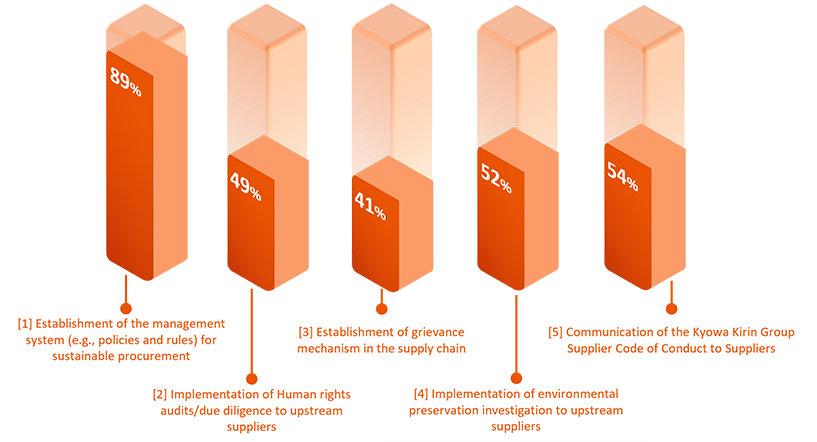Sustainable Procurement
Policy and Strategy
Kyowa Kirin Group Procurement Policy & Kyowa Kirin Group Supplier Code of Conduct
Risk Management
Examples of Specific Initiatives
Sustainable Procurement Survey
Policy and Strategy
We at the Kyowa Kirin Group are promoting “sustainable procurement” in cooperation with our suppliers throughout the entire supply chain, carefully considering environmental friendliness, social responsibility, economic sustainability, and various other factors.
To reliably promote the initiatives of this “sustainable procurement”, we have stipulated the Kyowa Kirin Group Basic Procurement Policy*1, expressing our commitment to promoting “sustainable procurement” together with our suppliers. We have also established the Kyowa Kirin Group Supplier Code of Conduct*2 that summarizes our expectations of suppliers.
- *1:The Kyowa Kirin Group Procurement Policy is established based on the Kyowa Kirin Group Code of Conduct, which is established according to the policy of Kirin Group.
- *2:The Kyowa Kirin Group Supplier Code of Conduct is formulated with reference to the “Pharmaceutical Industry Principles for Responsible Supply Chain Management” developed by the Pharmaceutical Supply Chain Initiative (PSCI), a non-profit organization composed of global pharmaceutical companies.
Risk Management
To reliably deliver the Group's products to patients who need them, the Kyowa Kirin Group is implementing risk management throughout the entire supply chain.
To detect risks in the supply chain, we have set up a Human Rights Whistleblower Contact for a wide range of stakeholders in the supply chain.
Complaints and reports related to human rights (Whistleblower contact for a wide range of stakeholders)
The Group accepts human rights-related complaints and reports from all stakeholders in its supply chain through the engagement and remedy platform provided by the Japan Center for Engagement and Remedy on Business and Human Rights (JaCER), which is based on the United Nations Guiding Principles on Business and Human Rights.
- We are committed to resolving essential human rights issues by accepting complaints through a third party, thereby ensuring equality and transparency in the handling of complaints, and responding appropriately to complaints and whistleblowing.
- With respect to whistleblower's reports we receive, we will investigate the facts of the report, engage in necessary dialogue regarding the report, and implement corrective measures (including prevention of recurrence and response to objections).
- In responding to the whistleblower's report, the Company shall ensure that the whistleblower will not be disadvantaged and shall protect his/her personal information. Unless there is a justifiable reason to do so, such as when required by law, we will not use the information related to the case for any other purpose.
For whistleblowing through JaCER, information will be disclosed anonymously on JaCER's website on a regular basis.
Examples of Specific Initiatives
Joining the PSCI
In June 2024, the Kyowa Kirin Group joined the membership of the Pharmaceutical Supply Chain Initiative ("PSCI"), a non-profit organization working as one voice for the pharmaceutical industry to deliver responsible value chains.
Through the PSCI, we collaborate with industry leaders and participate in good practice of sustainable procurement in the pharmaceutical industry. In addition, in our effort to build a more efficient and effective auditing system, we will utilize the results of supplier audits conducted by PSCI member companies, which are shared through the PSCI Shared Audit Program.

Sustainable Procurement Survey
Every year, we conduct a "Sustainable Procurement Survey" according to each item of the Kyowa Kirin Group Supplier Code of Conduct, to grasp the actual situation of sustainable procurement activities conducted in our supply chain and identify issues to be addressed.
Sustainable Procurement Survey 2024
Outline of the Survey
- Number and content of questions: 48 multiple choice questions; question content can be found Here
 *3
*3 - Survey period: September 20, 2024 - November 8, 2024.
- Survey target: Japanese and overseas suppliers selected according to our standards.
- Number of respondents: 281, accounting for 85% of total procurement spend.
- *3:The content of the questions has been modified in accordance with the Kyowa Kirin Group Supplier Code of Conduct, which was revised in December 2023.
Survey Results
- The survey category “Establishment of the management system (e.g., policies and rules) for sustainable procurement” ([1] in the figure below) indicated good conditions in general.
- Regarding respect for human rights, there were 27% and 37% negative responses, respectively, to the survey categories “Establishment of a system to be aware of and improve human rights issues” ([2] in the figure) and “Establishment of grievance mechanism in the supply chain” ([3] in the figure). In light of the increasing social demands for respect for human rights, it is important to establish these systems as soon as possible. If any of our supplier companies find it difficult to set up their own grievance mechanism available to all employees in the supply chain, we encourage them to use the Kyowa Kirin Group's grievance mechanism (JaCER).
- Regarding environmental preservation, there were 21% negative responses for both “Establishment of an environmental management system” ([4] in the figure) and “Implementation of environment-related internal education/training” ([5] in the figure). Considering the increasing social demands for environmental preservation, we encourage our suppliers to establish an environmental management system as soon as possible. Furthermore, to ensure compliance with the policies and regulations established by each supplier, it is also important to provide internal education and training.
- Regarding the category “Communication of the Kyowa Kirin Group Supplier Code of Conduct and other legal requirements to suppliers” ([6] in the figure), the responses showed significant improvement from last year's data (54%). To promote sustainable procurement, all-encompassing efforts throughout the supply chain are essential. We sincerely ask all our suppliers to continue to inform and communicate the Kyowa Kirin Group Supplier Code of Conduct to their employees and secondary suppliers.
Status of Sustainability Activities in 2024

Supplier Briefings
We held a supplier briefing to share information on issues and solutions throughout the supply chain in 2018.
In November 2024, we held a supplier briefing (in the form of a webinar) that was attended by 205 companies.
The theme of this 2024 briefing, as last year, was "Toward a Sustainable Society".
We held this briefing not only as a forum to explain the Kyowa Kirin Group's policies and initiatives but also as an opportunity to consider jointly with suppliers about what we can do for respect for human rights and environmental preservation, for which social request is increasing in recent years, along with the promotion of sustainable procurement.

Human Rights Due Diligence
Kyowa Kirin also conducts human rights due diligence investigations of its suppliers.
In 2023, we conducted a survey regarding foreign technical interns of suppliers at the Takasaki Plant. As part of the survey, at a supplier already accepting technical interns (Shin-Nippon Wex Co., Ltd.), we conducted direct interviews with the management division and technical interns. As a result, we checked that there were no particular concerns about human rights violations as of that time, and we provided our survey reports to Shin-Nippon Wex as our feedback.
We will continue to investigate and evaluate human rights issues in our supply chain.
